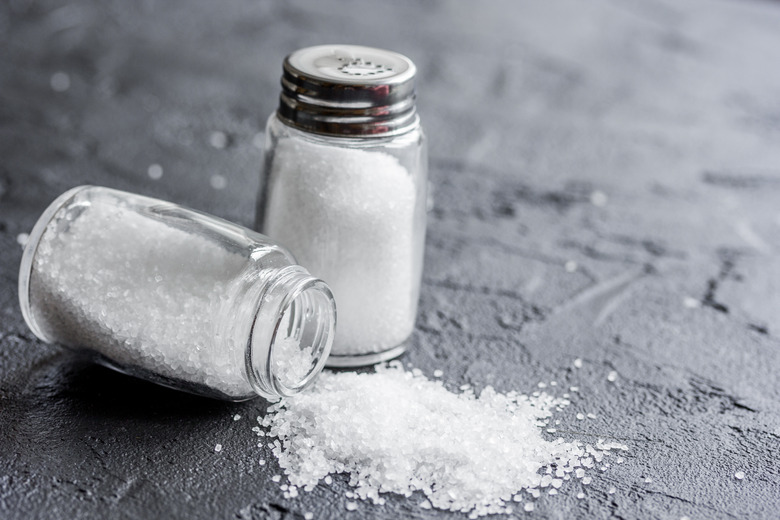What Determines The Strength Of An Acid?
An acid gets its characteristics from the hydrogen atoms of its molecules. Strong acids have weakly bound hydrogen atoms, and the molecules easily separate from them in solution. How many of these hydrogen atoms dissociate and form hydrogen ions determines the strength of an acid. Strong acids lose most or all of their hydrogen atoms in a water solution and form H3O ions with a positive charge. The rest of the acid molecule forms a separate ion with a negative charge.
TL;DR (Too Long; Didn't Read)
For strong acids, most or all of the weakly bound hydrogen atoms in their molecules form hydrogen ions in a water solution. Weak acids stay mostly together as molecules, and only a few of their hydrogen atoms form ions. The positive hydrogen ions and corresponding negative ions of the rest of the acid molecule give acids their principal characteristics.
Strong Acids and How They Dissociate
Strong Acids and How They Dissociate
The strongest commonly available acids include hydrochloric acid, HCl, and sulfuric acid, H2SO4. The bond between the hydrogen and chlorine atoms of hydrochloric acid is weak enough that all the hydrogen atoms dissociate themselves from the chlorine atoms when the acid dissolves in water. The hydrogen atoms in the hydrochloric acid molecules lost their single electrons to the chlorine atoms in the chemical reaction that formed the hydrochloric acid compound. As a result, the hydrogen atoms form ions with a plus one charge, and the chlorine atoms form ions with a charge of minus one.
Similarly, the hydrogen atoms of the sulfuric acid molecule lost their electrons in the chemical reaction that formed sulfuric acid. They are also weakly held and dissociate themselves from the SO4 atoms to form two hydrogen ions with a plus one charge. The SO4 atoms form a negative sulfate ion with a charge of minus two.
How Strong Bases Dissociate
How Strong Bases Dissociate
Where the hydrogen ions of strong acids dissociate in water and give the solution the characteristics of an acid, the hydroxide ion plays the same role for strong bases. Sodium hydroxide, NaOH, and calcium hydroxide, Ca(OH)2, are examples of strong bases that dissociate completely in water. The weakly held OH ion with a charge of minus one dissociates from the sodium ion with a charge of plus one or the calcium ion with a charge of plus two. The large number of OH ions in the water gives the solution the characteristics of a strong base.
When Strong Acids and Strong Bases React
When Strong Acids and Strong Bases React
Because strong acids and bases completely dissociate in water, they can neutralize each other and produce a stable salt. If the correct proportions of an acid and a base are slowly mixed, the H hydrogen ions with a positive charge combine with the negatively charged OH hydroxide ions to form water. The other parts of the molecules dissolved in the water combine to form a salt.
For example, if sodium hydroxide is slowly added to hydrochloric acid, the OH ions of the sodium hydroxide combine with the H ions of the hydrochloric acid to form water. The sodium ions combine with the chlorine ions to form sodium chloride or table salt. Because of the strength of the acid and the base, all their ions dissolved, and all combined to form water. Strong acids and strong bases can completely neutralize each other.
Cite This Article
MLA
Markgraf, Bert. "What Determines The Strength Of An Acid?" sciencing.com, https://www.sciencing.com/what-determines-the-strength-of-an-acid-13710480/. 15 March 2018.
APA
Markgraf, Bert. (2018, March 15). What Determines The Strength Of An Acid?. sciencing.com. Retrieved from https://www.sciencing.com/what-determines-the-strength-of-an-acid-13710480/
Chicago
Markgraf, Bert. What Determines The Strength Of An Acid? last modified March 24, 2022. https://www.sciencing.com/what-determines-the-strength-of-an-acid-13710480/
